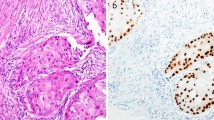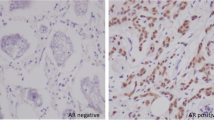Abstract
The androgen receptor (AR) has been shown to be of potential prognostic importance in retrospective cohorts. We evaluated immunohistochemical AR expression on a tissue microarray of 673 core biopsies from primary breast cancer patients treated with neoadjuvant docetaxel/doxorubicin/cyclophosphamide (TAC) chemotherapy in the prospective GeparTrio phase-III trial. AR was detected in 53.2% of tumours. Lowest AR expression was detected in triple-negative breast cancers (TNBC) with 21.2%. Highest AR expression was observed in Luminal A-like tumours with 67%. In AR-positive tumours, pathological complete response (pCR) rate was 12.8% compared to 25.4% in AR-negative tumours (P < 0.0001). In multivariate analysis, AR independently predicted pCR (OR 1.86; 95% CI [1.16–2.79] P = 0.0086). Overall patients with an AR-positive tumour had a significant better disease-free (DFS) (AR-positive 78.9% vs. AR-negative 72.5%; log-rank P = 0.0329) and overall survival (OS) (88.8% vs. 82.7%; log-rank P = 0.0234) than those with AR-negative tumours. Stratified analysis revealed that in the TNBC subgroup, but not in the other subgroups defined by ER, PgR and HER2, AR expression predicted a better DFS (AR-positive 85.7% vs. AR-negative 65.5% log-rank P = 0.0544) and OS (95.2% vs. 76.2%; log-rank P = 0.0355). Within the non-pCR subgroup, AR positivity selected a group with a significant better DFS (P = 0.045) and OS (0.021) but not within the pCR group. Patients with an AR-negative tumour have a higher chance of achieving a pCR than those with an AR-positive one. But, patients with AR-positive tumours have a better survival especially if they did not achieve a pCR.





Similar content being viewed by others
References
Huober J, von Minckwitz G, Denkert C, Tesch H, Weiss E, Zahm DM et al (2010) Effect of neoadjuvant anthracycline-taxane-based chemotherapy in different biological breast cancer phenotypes: overall results from the GeparTrio study. Breast Cancer Res Treat 124:133–140
Foulkes WD, Smith IE, Reis-Filho JS (2010) Triple negative breast cancer. N Engl J Med 363(20):1938–1948
Liedtke C, Mazouni C, Hess KR, André F, Tordai A, Mejia JA, Symmans WF, Gonzalez-Angulo AM, Hennessy B, Green M et al (2008) Response to neoadjuvant therapy and long-term survival in patients with triple-negative breast cancer. J Clin Oncol 10:1275–1281
Kuenen-Boumeester V, Van der Kwast TH, Claassen CC, Look MP, Liem GS, Klijn JG, Henzen-Logmans SC (1996) The clinical significance of androgen receptors in breast cancer and their relation to histological and cell biological parameters. Eur J Cancer 32:560–1565
Rakha EA, El-Sayed ME, Green AR, Lee AH, Robertson JF, Ellis IO (2007) Prognostic markers in triple-negative breast cancer. Cancer 109:25–32
Ogawa Y, Hai E, Matsumoto K, Ikeda K, Tokunaga S, Nagahara H, Sakurai K, Inoue T, Nishiguchi Y (2008) Androgen receptor expression in breast cancer: relationship with clinicopathological factors and biomarkers. Int J Clin Oncol 13(5):431–435
Park S, Koo J, Park HS, Kim JH, Choi SY, Lee JH, Park BW, Lee KS (2009) Expression of androgen receptor in primary breast cancer. Ann Oncol 21(3):488–492
Rakha EA, Reis-Filho JS, Ellis IO (2008) Basal-like breast cancer: a critical review 2008. J Clin Oncol 26:2568–2581
von Minckwitz G, Kümmel S, Vogel P, Hanusch C, Eidtmann H, Hilfrich J, Gerber B, Huober J, Costa SD, Jackisch C et al (2008) Neoadjuvant vinorelbine-capecitabine versus docetaxel-doxorubicin-cyclophosphamide in early nonresponsive breast cancer: phase III randomized GeparTrio trial. J Natl Cancer Inst 100:542–551
von Minckwitz G, Kümmel S, Vogel P, Hanusch C, Eidtmann H, Hilfrich J, Gerber B, Huober J, Costa SD, Jackisch C et al (2008) Intensified neoadjuvant chemotherapy in early-responding breast cancer: phase III randomized GeparTrio study. J Natl Cancer Inst 100:552–562
Remmele W, Stegner HE (1987) Recommendation for uniform definition of an immunoreactive score (IRS) for immunohistochemical estrogen receptor detection (ER-ICA) in breast cancer tissue. Pathologe 8:138–140
Moinfar F, Okcu M, Tsybrovskyy O, Regitnig P, Lax SF, Weybora W, Ratschek M, Tavassoli FA, Denk H (2003) Androgen receptors frequently are expressed in breast carcinomas: potential relevance to new therapeutic strategies. Cancer 98:703–711
Castellano I, Allia E, Accortanzo V, Vandone AM, Chiusa L, Arisio R, Durando A, Donadio M, Bussolati G, Coates AS et al (2010) Androgen receptor expression is a significant prognostic factor in estrogen receptor positive breast cancers. Breast Cancer Res Treat 124:607–617
Gonzalez-Angulo AM, Stemke-Hale K, Palla SL, Carey M, Agarwal R, Meric-Berstam F, Traina TA, Hudis C, Hortobagyi GN, Gerald WL et al (2009) Androgen receptor levels and association with PIK3CA mutations and prognosis in breast cancer. Clin Cancer Res 15:2472–2478
Hammond EH, Hayes DF, Dowsett M et al (2010) American Society of Clinical Oncology/College of American Pathologists Guideline Recommendations for immunohistochemical testing of estrogen/progesterone receptors in breast cancer. J Oncol Pract 6(4):195–197
Agoff SN, Swanson PE, Linden H, Hawes SE, Lawton TJ (2003) Androgen receptor expression in estrogen receptor-negative breast cancer. Immunohistochemical, clinical, and prognostic associations. Am J Clin Pathol 120:725–731
Micello D, Marando A, Sahname N, Riva C, Capella C, Sessa F (2010) Androgen receptor is frequently expressed in HER2-positive ER/PR-negative breast cancers. Virchows Arch 457:467–476
Luo X, Shi YX, Li ZM, Jiang WQ (2010) Expression and clinical significance of androgen receptor in triple negative breast cancer. Chin J Cancer 29:585–590
Berry DA, Cirrincione C, Henderson IC, Citron ML, Budman DR, Goldstein LJ, Martino S, Perez EA, Muss HB, Norton L, Hudis C, Winer EP (2006) Estrogen-receptor status and outcomes of modern chemotherapy for patients with node-positive breast cancer. JAMA 295:1658–1667
Guarneri V, Broglio K, Kau S-W, Cristofanilli M, Buzdar AU, Valero V, Buchholz T, Meric F, Middleton L, Hortobagyi GN et al (2006) Prognostic value of pathological complete response after primary chemotherapy in relation to hormone receptor status and other factors. J Clin Oncol 24:1037–1044
He J, Peng R, Yuan Z, Wang S, Peng J, Lin G, Jiang X, Qin T (2011) Prognostic value of androgen receptor expression in operable triple-negative breast cancer: a retrospective analysis based on a tissue microarray. Med Oncol. doi:10.1007/s12032-011-9832-0
Abrial SC, Penault-Llorca F, Delva R, Bougnoux P, Leduc B, Mouret-Reynier MA, Mery-Mignard D, Bleuse JP, Dauplat J, Curé H et al (2005) High prognostic significance of residual disease after neoadjuvant chemotherapy: a retrospective study in 710 patients with operable breast cancer. Breast Cancer Res Treat 94:255–263
Untch M, Fasching PA, Konecny G, Hassmüller S, Lebau A, Kreienberg R, Camara O, Müller V, du Bois A, Kühn T et al (2011) Pathological complete response after neoadjuvant chemotherapy plus trastuzumab predicts favorable survival in HER2-overexpressing breast cancer—results from the TECHNO trial of the AGO and GBG study groups. J Clin Oncol. doi:10.1200/JCO.2010.31.4930
Gucalp A, Traina TA (2010) Triple-negative breast cancer: role of the androgen receptor. Cancer J 16(1):62–65
Sapino A, Marchiò C, Senetta R, Castellano I, Macrì L, Cassoni P, Ghisolfi G, Cerrato M, D’Ambrosio E, Bussolati G (2006) Routine assessment of prognostic factors in breast cancer using a multicore tissue microarray procedure. Virchows Arch 449:288–296
Yu Q, Niu Y, Liu N, Zhang JZ, Liu TJ, Zhang RJ, Wang SL, Ding XM, Xiao XQ (2011) Expression of androgen receptor in breast cancer and its significance as a prognostic factor. Ann Oncol 22(6):1288–1294
Cheang MC, Chia SK, Voduc D, Gao D, Leung S, Snider J, Watson M, Davies S, Bernard PS, Parker JS et al (2009) Ki67 index, HER2 status, and prognosis of patients with luminal B breast cancer. J Natl Cancer Inst 101:736–750
Voduc KD, Cheang MCU, Tyldesley S, Gelmon K, Nielsen TO, Kennecke H (2010) Breast cancer subtypes and the risk of local and regional relapse. J Clin Oncol 28:1684–1691
Acknowledgments
We would like to thank all the patients donating their tissue and the investigators for making this research possible. This research did not receive any specific grant from any funding agency in the public, commercial or not-for-profit sector.
Conflict of interest
There is no conflict of interest that could be perceived as prejudicing the impartiality of the research reported.
Author information
Authors and Affiliations
Corresponding author
Rights and permissions
About this article
Cite this article
Loibl, S., Müller, B.M., von Minckwitz, G. et al. Androgen receptor expression in primary breast cancer and its predictive and prognostic value in patients treated with neoadjuvant chemotherapy. Breast Cancer Res Treat 130, 477–487 (2011). https://doi.org/10.1007/s10549-011-1715-8
Received:
Accepted:
Published:
Issue Date:
DOI: https://doi.org/10.1007/s10549-011-1715-8




